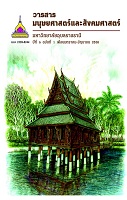การจัดการความรู้เพื่อกำหนดทางเลือกในการปลูกข้าวของเกษตรกรในพื้นที่ภัยแล้ง กรณีศึกษาเกษตรกรตำบลออนใต้ อำเภอสันกำแพง จังหวัดเชียงใหม่
Main Article Content
บทคัดย่อ
การวิจัยนี้มีวัตถุประสงค์เพื่อประยุกต์ใช้กระบวนการจัดการความรู้ในการกำหนดทางเลือกในการปลูกข้าวและวิเคราะห์ปัจจัยเงื่อนไขที่อาจเกี่ยวข้องกับการนำทางเลือกสู่การปฏิบัติในพื้นที่แห้งแล้งของเกษตรกรตำบลออนใต้ อ.สันกาแพง จ.เชียงใหม่ โดยการสำรวจพื้นที่การสัมภาษณ์เชิงลึกและจัดประชุมกลุ่มย่อยกับเกษตรกรผู้ปลูกข้าวและผู้เกี่ยวข้องรวมทั้งการรวบรวมเอกสารที่เกี่ยวข้องและจัดประชุมระดมความคิดเห็นจากผู้เชี่ยวชาญผลการศึกษาพบว่ากระบวนการจัดการความรู้สำหรับการกาหนดทางเลือกการปลูกข้าวประกอบไปด้วย 4 ขั้นตอนตามลาดับต่อไปนี้ 1) การระบุปัญหาและการค้นหาความรู้ 2) การกาหนดทางเลือกเบื้องต้น 3) การประเมิน กลั่นกรอง และคัดเลือกทางเลือกที่เหมาะสม และ 4) การเสนอแนวทางปฏิบัติการทดสอบทางเลือกและการติดตามประเมินผล ทั้งนี้ทางเลือกที่ชุมชนร่วมกันคัดเลือกสู่การปฏิบัติการทดสอบและติดตามประเมินผลต่อไป ได้แก่ การเพิ่มประสิทธิภาพการจัดการแหล่งน้ำและระบบส่งจ่ายน้ำ และการลดปริมาณการใช้น้ำในการปลูกข้าวและการเกษตรอื่น ส่วนปัจจัยเงื่อนไขที่อาจส่งผลต่อปฏิบัติการของแต่ละทางเลือก ได้แก่ 1) ปัจจัยภายใน ประกอบด้วยสถานภาพทางเศรษฐกิจและต้นทุนการผลิต และความสามารถในการปรับตัวของชุมชน โดยมีเงื่อนไขคือ จิตสำนึกและการมีส่วนร่วมของผู้เกี่ยวข้อง และการแลกเปลี่ยนเรียนรู้ภายในชุมชน และ 2) ปัจจัยภายนอก ประกอบด้วยการสนับสนุนของหน่วยงานที่เกี่ยวข้อง การพัฒนาฐานข้อมูลความรู้ และการส่งเสริมตลาดเกษตรอินทรีย์ โดยมีนโยบายและยุทธศาสตร์รัฐเป็นเงื่อนไขสำคัญ
Knowledge Management for Determining Alternatives of Rice Cultivation in Drought Area: a Case Study of Farmer at On Tai Sub-District, Sankampang District, Chiang Mai, Thailand
This study aimed to apply the process of knowledge management for the determination of alternatives to rice cultivation in drought areas and to analyze factors affecting the implementation of these alternatives. It focused on farmers in On Tai Sub-district, Sankampang District, Chiang Mai, Thailand. Data were collected by surveys, in-depth interviews, focus groups of farmers and municipal council members, related documents, and brain-storming with experts. Results indicated four steps of knowledge management; 1) identification of problems and investigation of knowledge, 2) determination of alternatives, 3) assessment and selection, and 4) planning for action and evaluation. The farmers in On Tai Sub-district selected two alternatives for action and evaluation, improvement of water management and water supply system, and reduction of water use for rice and plant cultivation. The action of these alternatives depended upon the internal factors of economic status and cost production, and the external factors of database development of knowledge, promotion of agencies, and promotion of the sale of organic products. The conditions of the internal factors were awareness and participation of stakeholders in the communities and knowledge sharing inside the communities, and the conditions of external factors were government policy and strategy.
Article Details
บทความที่ได้รับการตีพิมพ์เป็นลิขสิทธิ์ของวารสารมนุษยศาสตร์และสังคมศาสตร์ มหาวิทยาลัยอุบลราชธานี
ข้อความที่ปรากฏในบทความแต่ละเรื่องในวารสารวิชาการเล่มนี้เป็นความคิดเห็นส่วนตัวของผู้เขียนแต่ละท่านไม่เกี่ยวข้องกับมหาวิทยาลัยอุบลราชธานี และคณาจารย์ท่านอื่นๆในมหาวิทยาลัยฯ แต่อย่างใด ความรับผิดชอบองค์ประกอบทั้งหมดของบทความแต่ละเรื่องเป็นของผู้เขียนแต่ละท่าน หากมีความผิดพลาดใดๆ ผู้เขียนแต่ละท่านจะรับผิดชอบบทความของตนเองแต่ผู้เดียว


